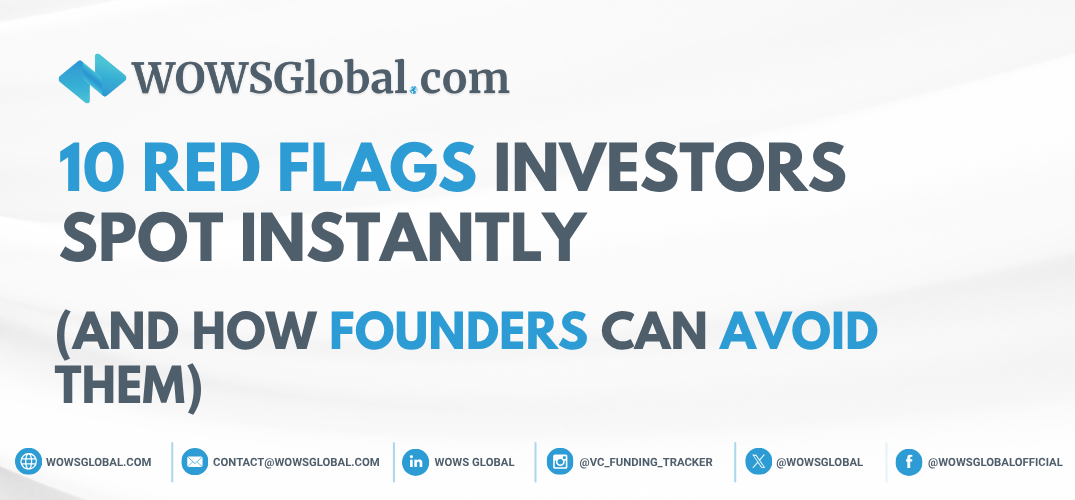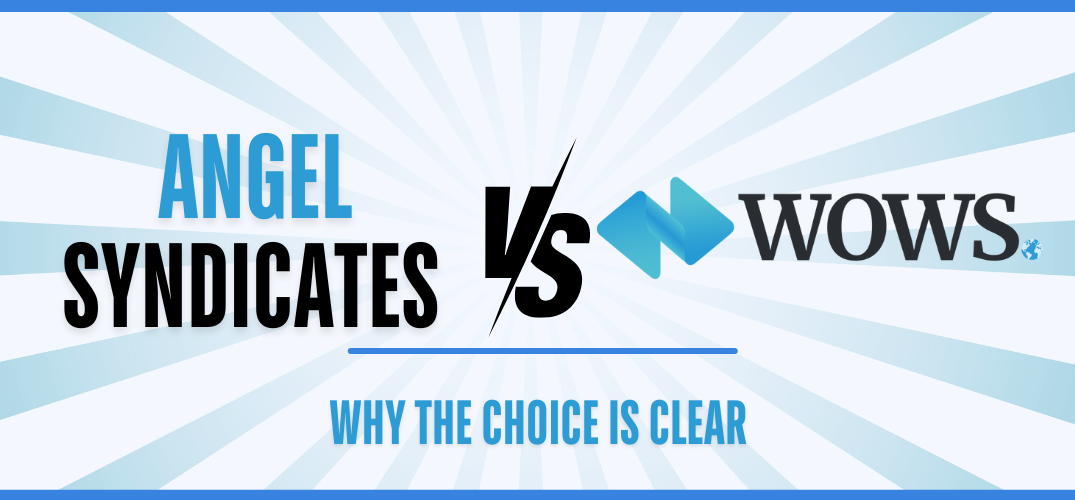A-Z of Fundraising for Founders (Part: 5 T-Z)
Fundraising for Founders A - Z of Fundraising Fundraising

Founders of startups have a lot to contend with as they formalize their ideas, turn them into reality, and then proceed to grow their business healthily.
As you progress, the world (and art!) of successful fundraising will become more and more important.
Similar to all business sectors, startup founders will encounter fundraising abbreviations, acronyms, terms that speak for themselves, and others that are far more obscure.
To help you grasp exactly what these terms mean, here's a comprehensive A-Z of fundraising for founders from WOWS Global. This handy reference guide will help every founder talk the fundraising talk with confidence.
Because we are digging deep to deliver everything related to fundraising this guide will be split into easy-to-read parts. This is part 5 - The final section covering the letters T to Z:
Part 5 - T to Z
T is for:

Tag-Along Rights: This is an interesting stipulation for founders. It is a clause stating that if the founder decides to sell their shares to a buyer, an investor has the option of offering their shares to that buyer for the same amount.
Target Market: Founders need to clarify their target market to potential investors. It is the consumer group(s) that will use your product or service. Target Market characteristics include such things as geographic location, demographics, education, income, and lifestyles.
Term Sheet: Founders must understand the full details of a term sheet before committing. While a term sheet is a non-binding agreement, it is designed to give the basic terms and conditions of an investment
A term sheet specifically highlights areas of interest for investment purposes of various investors and is often used as a template for future legal documents.
Tranche: This is a staged investment procedure. Investors will typically give investment funds over 2 or 3 milestones and this will be based on the company’s progress.
U is for:

Uncapped Notes: This is a funding practice that has been designed for founder protection. Uncapped notes do not guarantee that investors will be granted a specific equity amount per ‘Dollar’ invested.
Underwater: An adjective used to describe a security whose FMV (Fair Market Value) today is less than its original issuance or exercise price. In short: If the security expired today it would be worthless.
Underwriter: An investment bank who will have a contractual obligation to take any securities onto their books should the company they are vested in fail.
Unicorn: In the VC (Venture Capital) industry, Unicorn refers to any startup that reaches a valuation of $1 Billion. These startups are often in the tech or software business sectors.
Unsecured Debt: This refers to loans that are not backed by collateral. Should the borrower default on the loan the lender might not be able to recover the investment given. This is because the borrower has not been required to pledge any specific asset(s) as loan security.
As can be seen, unsecured loans are considered to be riskier for the lender. With that in mind, unsecured debt loans generally carry higher interest rates than a collateralized loan would do.
Unvested: A term used as a description relating to the status of securities that remain subject to mandatory buyback provisions or forfeiture. This is the case even after being granted to, or set aside for an individual.
It is typical for unvested securities to transform into vested securities that are not subject to the mentioned buyback or forfeiture over time, or once certain benchmarks or specified conditions of an RSPA (Restricted Stock Purchase Agreement) have been met.
V is for:

Valuation: A process by which a company’s value is determined. A company experienced and committed to assisting startups will be able to assist with your company valuation. They will also provide positive feedback on methods that help to improve your valuation.
Venture-Backed Startup: Venture-Backed Startups can seem like a golden goose to founders. This is because they are startups that receive very early venture capital funding. It is a fact that the vast majority of startups do not receive venture capital in early fundraising rounds. To get such capital they need to prove the company is viable.
This means that any founder accepting venture-backed startup funding needs to be very aware of what they are giving up in terms of company control and ownership percentage.
Venture Capital Fund: A type of private fund managed by a venture capital firm.
Venture Capitalist: An individual investor working at a venture capital firm. Their role is to make investment decisions. Venture capitalists are always on the lookout for startups that appeal to their funding strategy (ones that promise them high returns!).
Venture Debt: Relates to a bank lending money to startups. Because startups are such a risky investment they do not generally qualify for an initial, traditional bank loan. That type of bank loan opportunity comes much later in a startup's life cycle.
However, there are a small number of banks that will lend funds to startups as part of a large venture round.
Vesting: An act whereby the company grants stock options to an employee
Vesting Schedule: This is a mechanism for founders and key employees to earn share ownership in the startup over an agreed period of time. The breakdown of this period is known as a vesting schedule.
Voting Rights: A voting right gives a stockholder the right to vote on corporate management matters.
Vulture Capitalist: An individual that founders need to avoid! A Vulture Capitalist is slang for a Venture Capitalist who seeks to extract value from any company that is in decline. Their goal is to swoop in when sentiment is low and a company has almost reached rock bottom.
This allows them to purchase shares for next to nothing, they then take whatever action is necessary to engineer a rapid turnaround and then sell it on for a profit. If that fails then assets will be stripped to garner a profit.
W is for:
Warm Introduction: Founders should nurture any warm introductions they can get. These are introductions made by an acquaintance to an influential person they know and one a founder would very much like to meet.
This introduction comes coupled with a ‘personal’ endorsement. In the VC world, a warm introduction is classed as the gold standard.
Warrant: A warrant gives the right to buy or sell a security at a certain price and during a specified time period.
Wash-Out Round: This is a round of financing in which the founder(s) are so diluted that their actual voting power becomes minimal. Essentially they are “washed-out”.
Weighted Average Anti-Dilution: Another investor protection tool. A preferred shareholder’s conversion price (that is the price at which preferred shares are converted to common shares) is adjusted in a subsequent funding round to a lower PPS (Price Per Share).
This is calculated using the share price and the number of shares issued during the new round. The result? Each preferred share converts into a greater number of common shares. This protects the preferred shareholder from dilution.
Weighted Average Cost Of Capital (WACC): A formula that is used to determine a company’s cost of capital. WACC is the total of the average equity cost plus the debt cost after tax. How is this average weighted? It is based on debt to debt ratio plus equity and equity to equity plus debt.
Y is for:

Year-Over-Year (YOY): Is also referred to as Year-On-Year. It is a frequently used financial comparison term when looking at 2 or more measurable events on an annualized basis.
By observing YOY performance, companies and investors can gauge if performance is remaining static, improving, or worsening.
Z is for:
Zombie: A slang term used for a venture-backed company that is almost terminated. Basically, the company is “walking dead”. In general, the company concerned is maintaining just enough of a cash flow to keep their doors open while looking for someone to acquire them.
It is often the case that current investors will put in a little more money to allow the company to survive and seek a sale. If that can be achieved then the current investors may recover all or most of their initial investment.
Zone of Insolvency: This relates to a company that is very close to being insolvent. One that has insufficient assets or money to pay off their liabilities.
The Bottom Line!
That’s it for our comprehensive 5-part A-Z of fundraising terms for startup founders.
Before closing, the highly experienced team at WOWS Global would like to stress just how important the “bottom line” or “Net Income” is to founders.
This is your company’s income after all expenses have been deducted from revenues. These expenses include your general and administrative costs, any interest charges paid on loans, and any taxes due.
In this respect, WOWS Global is here to ensure that as your company grows in a structured way your bottom line grows with it.
We have built a secure, digital ecosystem that is designed to give smart startup founders every opportunity of building a successful and growing business.
In short, WOWS is fully able and ready to assist you on your startup journey and beyond.
To find out how we can help you gain the leverage necessary to make your fundraising efforts effective, please do not hesitate to reach out to us for a no-obligation discussion on:
Related Posts
-

Fundraising 409A Valuation Cap Table Management Investor
WTF Is 409A and Why Should I Care?
Learn what a 409A valuation is, why it matters for employee stock options and how it impacts founders, investors, taxes and diligence, plus how WOWS Global can help. -

Early Startups Fundraising Due Diligence Data Room
2026 Fundraising: What Changed?
Fundraising in 2026 isn’t about moving faster—it’s about showing up prepared. Learn how to build an investor-ready system (modeling, governance, data room, and investor fit) so diligence doesn’t drag and your strongest conversations go the distance. -

Fundraising investor relations Traction Financials
10 Red Flags Investors Spot Instantly (And How Founders Can Avoid Them)
From vague problems to broken cap tables, these are the 10 signals that turn investors off—plus practical fixes so you can raise with confidence. -

Fundraising Angel Syndicates VC
The Battle of Angel Syndicates vs. WOWS Global: Why the Choice is Clear
WOWS Global vs. Angel Syndicates: A detailed comparison of costs, network depth, technology, and expert support. Learn why WOWS Global is the better choice for startup fundraising and scaling. -

Startups Fractional CFO Fundraising
Why Your Accounting Director Might Not Be Enough: The Surging Demand for Fractional CFOs in Startups
In the fast-paced world of startups, having an Accounting Director may not be enough. Discover why over 75% of pre-Series B startups are turning to fractional CFOs for strategic financial guidance that can make or break your growth trajectory. -

Early-Stage Investors Funding Funding Round Fundraising for Founders Investor
Shh! Don’t Share These Fundraising Insider Secrets
Startup founders need to fasten their seatbelts and prepare for a roller-coaster ride if they are to achieve success. It is a straight fact that founders will find themselves wearing many hats to get their venture up, running, and thriving.
